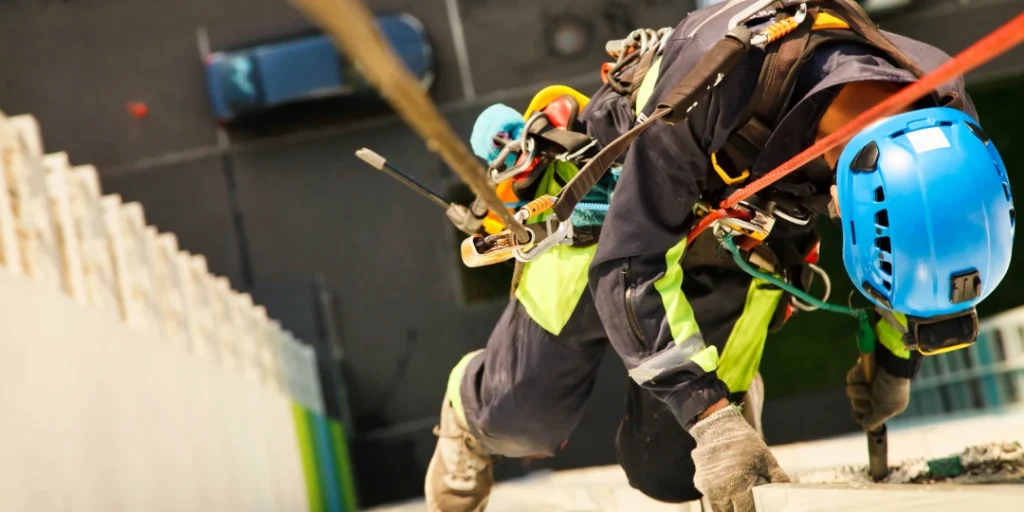Introduction:
When it comes to workplace safety training in Nashville, Fortier Loss Control stands out as a trusted provider of OSHA-authorized instruction. With over 30 years of experience helping businesses comply with safety regulations, Fortier Loss Control delivers OSHA 10-hour and 30-hour training courses for both construction and general industry. These courses (often called “OSHA 10” or “OSHA 30” certification) equip workers and supervisors with vital knowledge to prevent accidents and maintain compliance. In this guide, we’ll answer the most common questions about OSHA 10/30 training – from what the programs include and who should take them, to certification requirements in Tennessee, and the benefits for your workforce. Whether you’re a beginner, a seasoned professional, or a business owner in the Nashville area, this overview will help you navigate OSHA training and understand why Fortier Loss Control is the go-to resource for keeping your workplace safe.
What is OSHA 10/30-Hour Training?
OSHA 10-hour and 30-hour training are part of the Occupational Safety and Health Administration’s Outreach Training Program, which provides basic and advanced instruction on common workplace hazards and OSHA safety standards. The “OSHA 10” is a ten-hour entry-level course, while the “OSHA 30” is a thirty-hour advanced course intended for those with supervisory or safety management roles. Upon completion of the training, participants receive an official Department of Labor OSHA course completion card (often informally called an OSHA certification card) as proof of training.
It’s important to note that OSHA itself does not technically “certify” workers – instead, OSHA authorizes trainers and providers like Fortier Loss Control to deliver these courses, and students earn a completion card rather than a license. In practice, however, employers and workers commonly refer to the achievement as an OSHA 10 or OSHA 30 certification, and having this credential signifies that you’ve learned to recognize and prevent safety hazards on the job. Fortier Loss Control’s OSHA-authorized instructors lead the training, ensuring that Nashville-area participants get accurate, up-to-date safety guidance in line with federal standards.
Who should take OSHA 10 vs. OSHA 30?
OSHA 10 vs. OSHA 30 comes down to the level of responsibility and depth of safety knowledge needed for a given role. The OSHA 10-hour training is designed for entry-level workers, new employees, or anyone in need of a fundamental overview of workplace safety. This shorter course covers the essentials and is ideal for general laborers, construction tradespeople, or industry workers who are not in supervisory positions. In contrast, the OSHA 30-hour training is geared toward managers, supervisors, safety committee members, or workers with some safety responsibility on the job. The 30-hour program delves deeper into hazards and regulatory topics, preparing participants to not only recognize dangers but also implement and oversee safety procedures in the workplace.
In practical terms, if you are a front-line employee or a beginner in the field, OSHA 10 is likely sufficient and often the preferred choice. If you lead teams, supervise projects, or coordinate safety programs, OSHA 30 will be more appropriate, as it provides a greater variety of training topics and more comprehensive discussion of OSHA regulations. You do not need to take OSHA 10 before OSHA 30 – each course is standalone, and individuals can enroll in the level that matches their job needs. Fortier Loss Control can also help Nashville businesses assess which course is right for their staff based on roles and industry risks. Generally, providing OSHA 10 training for workers and OSHA 30 for supervisory personnel creates a well-rounded safety foundation across the organization.

What topics are covered in OSHA 10 and 30-hour training?
OSHA 10-hour training courses cover a broad range of fundamental safety and health topics, with specific content tailored to the industry (Construction vs. General Industry). OSHA sets minimum topic requirements for each course, ensuring that key hazard areas are addressed. Below is a breakdown of typical topics:
-
Construction (OSHA 10) – Mandatory modules include an Introduction to OSHA (workers’ rights, employer responsibilities, how to file a complaint) and about four hours on OSHA’s “Focus Four” hazards: Falls, Electrocution, Struck-By, and Caught-In/Between incidents. Additional topics cover Personal Protective Equipment (PPE), Health Hazards in Construction, and other safety basics like tool usage and ladder safety. Elective modules may include scaffolding, excavations, materials handling, and more, giving instructors flexibility to address site-specific dangers.
-
General Industry (OSHA 10) – The course similarly begins with an Introduction to OSHA (rights and responsibilities) and then covers core safety subjects such as Walking and Working Surfaces (including fall prevention), Emergency Action Plans (fire prevention and exit routes), Electrical Safety, Personal Protective Equipment, and Hazard Communication (chemical safety). Elective topics can include Machine Guarding, Materials Handling, Industrial Hygiene, Ergonomics, and other relevant hazards, ensuring the training touches on the most common risks in manufacturing, warehousing, healthcare, and other general industries.
-
OSHA 30-Hour Courses – The 30-hour versions for both construction and general industry include all the topics from the 10-hour training but with greater depth and additional subjects. Participants in an OSHA 30 class will explore each hazard area in more detail (often with expanded discussions on regulations and prevention strategies) and cover advanced topics like managing safety programs, conducting risk assessments, incident investigation, industrial hygiene, and other specialized areas relevant to supervisors. Because of the longer duration, OSHA 30 allows more time for interactive activities, case studies, and emphasis on OSHA standards for specific operations (e.g., cranes and rigging in construction or lockout/tagout in general industry).
OSHA 10-hour training provides a basic orientation to workplace safety, focusing on the most prevalent hazards and OSHA’s expectations, whereas OSHA 30-hour training offers a comprehensive deep dive, equipping individuals with the knowledge to not only identify hazards but also to implement and manage safety measures. Fortier Loss Control covers all required topics in their courses and can tailor certain elective components to address the specific risks of your job site or industry, making the training highly relevant to Nashville-area workplaces.
Is OSHA 10/30 training required in Tennessee?
In Tennessee, OSHA 10 and 30-hour training is not explicitly required by state law for most industries. Neither federal OSHA nor Tennessee’s state OSHA program (TOSHA) mandates that all workers carry an OSHA 10/30 certification; the Outreach Training Program is voluntary and intended as supplemental education. Tennessee has adopted federal OSHA standards without adding any extra requirement for 10-hour or 30-hour cards. This means that, unlike some states, there is no blanket law saying “all construction workers must have an OSHA 10 card” or similar in Tennessee.
However, individual employers or specific job sites may require OSHA training as a matter of company policy or contract. Many Nashville-area construction firms, for example, prefer or mandate that new hires complete OSHA 10-hour training to improve jobsite safety. Additionally, on certain federal projects or large industrial jobs, contract specifications might call for supervisors to hold an OSHA 30-hour card. While Tennessee itself does not require it, having this training can therefore be a practical necessity in many cases. It’s also worth noting that a few other states do have laws requiring OSHA Outreach training in particular circumstances. For instance, Connecticut requires an OSHA 10 card for workers on state-funded construction projects over $100,000, and Nevada imposes a requirement that OSHA 10/30 cards for construction be renewed every 5 years by state law. These examples underscore the value placed on OSHA training nationwide, even though Tennessee businesses have more flexibility.
In short, Tennessee employers are not legally obligated to have OSHA 10/30 certified workers in general. But investing in this training through a local provider like Fortier Loss Control is highly beneficial. It not only helps you meet any site-specific requirements that might arise, but also demonstrates a commitment to safety – something regulators and clients in Nashville appreciate even when it’s voluntary.
How do I get certified through Fortier Loss Control?
Getting your OSHA 10 or 30-hour certification through Fortier Loss Control is a straightforward process. Fortier is an OSHA-authorized training provider, so they handle all the steps from instruction to issuing your official completion card. Here’s how it works:
-
Enroll in the Appropriate Course: Start by contacting Fortier Loss Control and signing up for the OSHA course you need. You can reach out via phone or through the OSHA 10 & 30 Hour Certification page on Fortier’s website to see upcoming class schedules. Their team will help you choose the right course (Construction vs. General Industry, 10-hour vs. 30-hour) based on your needs and can register you or your employees for an available training session.
-
Attend the Training (Online or In-Person): On the scheduled dates, attend the OSHA training course led by Fortier’s experienced instructors. OSHA 10-hour classes are typically completed in two days (often 5 hours each day), while OSHA 30-hour classes may span four days or a couple of full weekends. Fortier offers both in-person classroom training in Nashville and live online training options, so you can choose the format that works best. During the course, you’ll participate in presentations, discussions, and practical exercises covering all required OSHA topics. (Don’t worry – these courses are designed to be engaging and informative, not just lectures!)
-
Complete All Course Requirements: OSHA’s Outreach courses are participation-based, which means there is no major exam to “pass” at the end. To earn your certification, you must attend all modules (for the full 10 or 30 hours) and actively participate. Fortier’s trainers may give short quizzes or knowledge checks to reinforce key points, but these are generally not high-stakes tests. As long as you complete the full course and demonstrate understanding of the material, the trainer will mark you as successfully completed. (If for some reason someone were to miss time or struggle with concepts, Fortier would work with them – but this is rarely an issue.)
-
Receive Your OSHA Completion Card: After finishing the training, Fortier Loss Control will process your information with their authorizing OSHA Training Institute Education Center to request your official OSHA card. You will receive a temporary certificate of completion right away, and the official OSHA 10-hour or 30-hour wallet card (issued by the U.S. Department of Labor) will be mailed to you. Typically, the DOL OSHA card arrives within a few weeks of the course. Fortier will ensure you get this card, which is the tangible proof of your OSHA training. Congratulations – you’re now “OSHA certified” in the eyes of employers!
By following these steps with Fortier Loss Control, Nashville workers and companies can efficiently obtain OSHA training credentials. Fortier handles all the paperwork and certification processing, making the experience hassle-free. Once you have your OSHA card, be sure to keep it in a safe place (and consider making a copy) so you can show it to employers or site supervisors when needed.

What are the benefits of OSHA training for workers and businesses?
Investing in OSHA 10/30-hour training pays off in numerous ways for both individual employees and the business as a whole. It’s not just about meeting a requirement – it’s about creating a safer, more productive workplace. Here are some of the key benefits:
Benefits for Businesses: Companies that prioritize OSHA training often see a significant drop in workplace accidents and injury rates. Fewer accidents mean fewer disruptions and direct cost savings – lower workers’ compensation claims, less spending on medical treatments, and avoidance of OSHA fines and penalties. In fact, OSHA notes that employers who invest in safety can expect higher productivity and improved financial performance due to less downtime and a more efficient workforce.
Beyond cost savings, providing OSHA training helps insulate a business from legal liabilities (by showing due diligence in training employees) and can even reduce insurance premiums over time, as many insurers recognize formally trained workplaces as lower risk. Moreover, a robust safety training program fosters a positive safety culture. Nashville businesses with strong safety records build better reputations in the community and industry – making it easier to attract contracts and top talent who want to work for a company that values their well-being.
Benefits for Workers: For employees, OSHA training is empowering. Workers gain practical knowledge on how to recognize hazards and protect themselves and their coworkers, which leads to a more confident and informed workforce. This training literally can be life-saving – employees learn how to avoid common dangers (from preventing falls to handling electrical equipment safely), so the chances of getting hurt on the job are greatly reduced.
A safer work environment means improved morale and trust; employees feel that their employer is investing in their safety, which increases job satisfaction and loyalty. OSHA training also educates workers about their rights under OSHA (such as the right to a safe workplace and the right to report hazards), so they are more likely to speak up and proactively address issues before they cause harm. In addition, having an OSHA 10 or 30 card can be a career booster. Many construction and industrial employers look for this credential when hiring.
Holding an OSHA certification sets a worker apart in a competitive job market and can even be a requirement for certain jobs or sites. In short, OSHA-trained employees not only stay safer and healthier – they often find increased opportunities and stability in their careers as a result.
OSHA 10/30 training benefits everyone in the organization. It creates a common knowledge base and safety language that improves communication on the job. Supervisors and workers begin to share responsibility for safety, leading to teamwork in hazard prevention. Over time, this results in a self-sustaining culture of safety: accidents go down, productivity goes up, and everyone from management to front-line staff understands that working safely is an absolute priority. Fortier Loss Control emphasizes these benefits in every training session, helping Nashville companies build safer workplaces that protect both people and profits.
Can OSHA 10/30 training be taken online or in-person?
Yes – OSHA 10 and 30-hour training can be completed either in-person or online, giving learners flexibility in how they receive their safety education. OSHA allows authorized providers to offer the 10hr and 30hr Outreach courses through online platforms as long as they meet certain requirements. Taking OSHA 10/30 online has become very popular, as it lets you proceed at your own pace from home or work. For example, many workers enroll in OSHA-accepted online courses and complete the training via interactive modules on their computer. Upon finishing, the online provider will process your OSHA card just like an in-person class would.
That said, some people prefer the in-person classroom experience – especially for the longer OSHA 30 course – to have direct interaction with the instructor and fellow students. In-person training can allow for hands-on demonstrations (like how to properly wear fall protection gear) and immediate Q&A for any doubts. Fortier Loss Control offers both options in the Nashville area: you can join a scheduled classroom session at their training facility or participate in live-online training sessions, depending on what fits your schedule. They make OSHA training accessible to all of Nashville’s diverse workforce by providing these flexible modes.
Both formats — online and in-person — cover the same OSHA-required content and result in the same official OSHA card. The key is to ensure you use a reputable, OSHA-authorized training source. Fortier’s programs (whether online or classroom) are led by certified OSHA Outreach trainers, so you can trust that the training meets all standards. Ultimately, the choice comes down to your learning preference and scheduling needs. Do you learn better with face-to-face instruction, or do you need the convenience of logging in after work hours? With Fortier, you have the freedom to choose, and in either case you’ll receive high-quality training that fulfills OSHA’s guidelines and equips you with essential safety knowledge.
How long does OSHA certification last?
An OSHA 10 or 30-hour certification (completion card) does not expire under federal OSHA rules. Once you earn an OSHA 10-hour or 30-hour card, it is generally valid for life – there is no official OSHA requirement to renew it after a certain period. The card serves as proof that you completed the training, and OSHA does not currently mandate any refresher or renewal coursework. In other words, if you obtained an OSHA 10 card, say, five years ago, that card is still considered valid today in terms of OSHA’s records.
However, it’s important to understand a few caveats and best practices:
-
Company or Project Policies: Even though OSHA doesn’t set an expiration, some employers or project owners choose to require retraining every so often (commonly every 3 to 5 years) to ensure workers’ knowledge stays up to date. Certain industries evolve with new regulations and risks, so a company might ask workers to retake OSHA 10/30 training after a few years as a proactive safety measure.
-
State-Specific Requirements: As mentioned earlier, a few states have laws that effectively put an expiration on OSHA cards for work in that state. For example, in Nevada, an OSHA 10 card is considered valid for 5 years for construction workers – after that, the worker must retrain to get a new card. Similarly, some cities or jurisdictions tied to local unions might expect refresher training periodically. These are exceptions rather than the rule, but worth noting if you travel for work.
-
Recommended Refreshers: Even without a mandate, refreshing your safety training is a good idea. OSHA updates standards and guidance over time, and you might forget details as the years pass. Many safety professionals suggest retaking OSHA 10 or attending other continuing education within about 5 years of your last training. In fact, OSHA’s Outreach program limits trainers from issuing replacement cards for classes completed more than 5 years ago – beyond that window, if you lose your card, OSHA expects you to retrain to get a new one. This isn’t an “expiration” per se, but it signals that a 5-year interval is a reasonable cycle for renewing knowledge.
In summary, your OSHA 10/30 certification is valid indefinitely at the federal level, and there is no hard expiration date on the card itself. But always stay aware of employer expectations or local requirements. If it’s been a long time since you took the course, or if major OSHA regulations have changed, it’s wise to consider a refresher to keep your safety skills sharp. Fortier Loss Control can always help arrange an update or advanced training if you need to brush up – safety is an ongoing commitment, and staying current is part of that commitment.

Frequently Asked Questions

Conclusion
OSHA 10-hour and 30-hour training courses are critical investments for workers and businesses committed to maintaining safe and compliant workplaces. Whether you’re an entry-level employee seeking foundational safety knowledge or a supervisor responsible for your team’s well-being, completing OSHA training through Fortier Loss Control provides lasting value. By choosing Fortier, Nashville businesses benefit from personalized, OSHA-authorized instruction tailored to local needs, enhancing both workplace safety and operational efficiency.
At Fortier Loss Control, workplace safety isn’t just a requirement—it’s a culture. Equip your team with the knowledge and confidence they need to stay safe, compliant, and productive. Reach out today and take the proactive step toward building a safer, stronger, and more successful work environment in Nashville and beyond.



